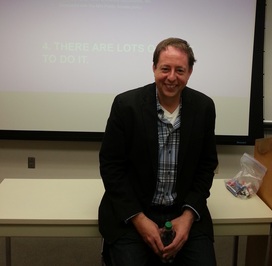I feel that there were so many important things that were touched upon in this presentation...
For Future Librarians: Professor Kelty said that librarians are essential, or on the frontlines, to ensuring that this policy really gains some traction within the university. In the future, if you are ever at a university that is considering adopting a similar policy, you will need to GET THE FACULTY ON BOARD! In our classes, it has been repeatedly stressed that the library is no longer a building and that we will have to define ourselves by the services that we provide that help our institutions fulfill their mission. One way that we can do all this is by raising awareness about what we provide and how much we pay for scholarly resources (the university spends around $40 million a year on journal subscriptions). I know that I often talk from the perspective of an aspiring academic librarian but this policy will benefit those working in public libraries as well. If you want a scholarly paper about a teaching or outreach method that you hope to implement in your library, you will have access to it if the author opts into their institution's open access policy. For Future Information Professionals ("Informasochists"): Professor Kelty talked a lot about the infrastructure of the eScholarship. The depository, which is provided by CDL, is currently preparing to implement some new tools that will help raise compliance to the policy. In Summer of 2014, they hope to launch a harvesting tool that will locate work written by faculty at compliant institutions, contact them, and ask them if the university could submit a copy into eScholarship. Professor Kelty hopes that eScholarship will be "invisible" within the next 10 years. By that he means that a person could perform a search in Google, locate an item, and then have immediate access to that article. Hopefully, no one will need to worry about where to find full text of a particular article. For Us All: I think that what I most took away from this presentation is the importance of understanding the economics of information, particularly within scholarly publishing. Despite the fact that information is made by the faculty, for the faculty, it seems like publishers currently possess a lot of the power. The faculty are even responsible for quality control through the peer review process. Professor Kelty stated that the UC faculty can contribute up to 12% of content in the Nature journals yet not have free access to the work it helped create. In the future, the nature of scholarly publishing may completely change because of information technologies. We no longer need journals to disseminate work but they could still have a different role in scholarly publishing. The quality control services such as peer-review and editing, as well as formatting, would definitely be a service that would appeal to a lot of researchers at various institutions, but it is unclear if publishers will one day offer just those services rather Only time will tell how the publishing world responds to these changes and we will be the ones leading the charge to promote access to all forms of information! I am sorry to ramble so much but I really felt that this is information with which we should be familiar. It has even inspired me to create a resource page dedicated to our open access policy (coming soon). Wishing you all the best, Nick Auricchio ALA President
0 Comments
Leave a Reply. |
About UsThe American Library Association is the oldest, largest and most influential library association in the world. For more than a century, it has been a leader in defending intellectual freedom and promoting the highest quality library and information services. Archives
April 2024
|

 RSS Feed
RSS Feed
